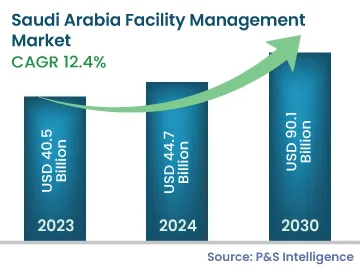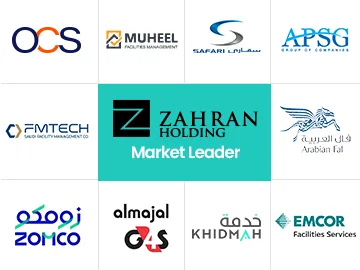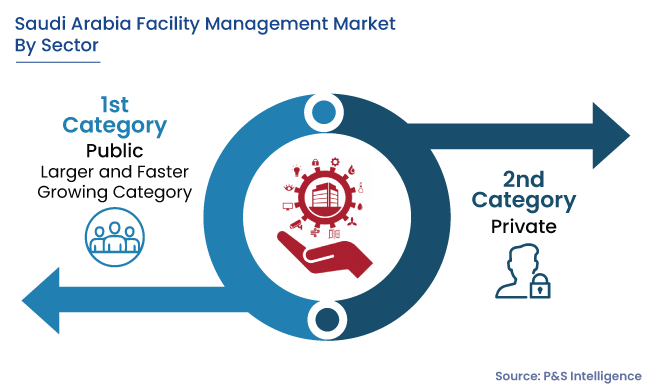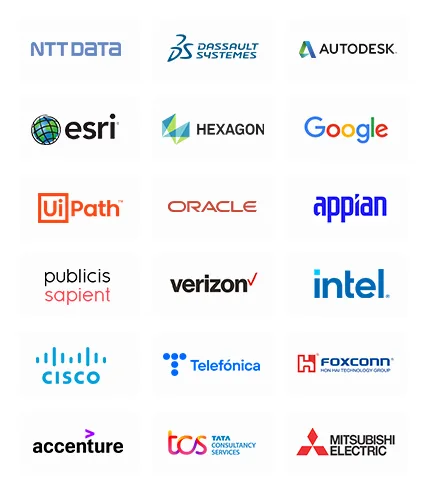Saudi Arabia Facility Management Market Size & Share Analysis - Trends, Drivers, Competitive Landscape, and Forecasts (2024 - 2030)
Get a Comprehensive Overview of Saudi Arabia Facility Management Market Report Prepared by P&S Intelligence, Segmented by Service (Property, Cleaning, Security, Catering, Support, Environmental Management), End User (Corporate and Business, Public Administration, Industry and Manufacturing, Hospitality, Healthcare, Construction, Education), Mode (In-House, Outsourced), Sector (Public, Private), Type (Hard, Soft), and Geographic Regions. This Report Provides Insights From 2017 to 2030.
Saudi Arabia Facility Management Market Size
Market Statistics
| Study Period | 2017 - 2030 |
| 2023 Market Size | USD 40.5 Billion |
| 2024 Market Size | USD 44.7 Billion |
| 2030 Forecast | USD 90.1 Billion |
| Growth Rate (CAGR) | 12.4% |
| Largest Province | Al-Riyadh |
| Fastest Growing Province | Al-Riyadh |
| Nature of the Market | Fragmented |
Market Size Comparison

Key Players

Key Report Highlights
|
Explore the market potential with our data-driven report
Saudi Arabia Facility Management Market Analysis
The Saudi Arabian facility management market generated USD 40.5 billion revenue in 2023, and it is projected to witness a CAGR of 12.4% during 2024–2030, reaching USD 90.1 billion by 2030. This is due to the increasing construction activities in the country, the growing tourism industry, and the rising adoption of advanced technologies and an integrated facility management approach.
Saudi Arabia Facility Management Market Trends & Growth Drivers
Partnerships and Collaborations Are Key Trends
- The major trend observed in the market is the country’s increasing investment in infrastructure to decrease its economic dependence on the oil & gas sector, which was severely affected by the slump in oil prices in 2015 and 2016.
- The government introduced an economic reform plan, known as Saudi Vision 2030, in 2016, which is a long-term economic roadmap that aims to decrease the country’s dependency on hydrocarbon.
- It also aims to increase private investments in non-extractive industries, such as infrastructure and transportation, which is expected to provide various opportunities to the facility management market.
Increasing Construction Activities Drive Market
- The major factor driving the growth of the market is the growing infrastructure industry owing to the large number of construction projects in various stages of execution. The country is expected to witness tremendous growth in construction activities, supported by the government.
- For example, the Ministry of Municipal and Rural Affairs has launched the Application of Smart City Concepts initiative as one of the municipal transformation projects emanating from the National Transformation Program 2020 and the Saudi Vision 2030.
- The major aim of the initiative is to enhance urban development in the country, which will further increase the level of satisfaction of people, boost the competitiveness of cities, and help in the achievement of urban sustainability.
- Further, this initiative has an objective to increase the productivity of city management, reduce the negative environmental impact, attract local & foreign investments, and create job opportunities.
- The government has also planned to target five cities in the country to apply the concept of smart cameras, smart parking, smart solid waste disposal, smart lighting systems, and environment pollution monitoring tools, which is expected to drive the need for facility management services in the country.
- With mega projects such as AMAALA, King Salman Park, QIDDIYA, Red Sea project, Jabal Omar, Diriyah Gate, NEOM, and King Abdullah Financial District, the Saudi Arabian government has also invested USD 2 million as seed capital in residential maintenance startups, such as B8ak, FalconViz, Ajeer, and Muqawiloon, which will further drive the market of Saudi Arabia facility management.
- Additionally, in February 2023, Saudi Arabia’s crown prince, Mohammed bin Salman, unveiled a grand plan, called the New Murabba Development Co., to redevelop the capital city of Riyadh. The plan aims at creating the world’s largest and most-modern downtown in Riyadh. With dimensions of 400 meters in length, breadth, and height each, The Mukaab shall be the largest built structure in the entire world. Being built in the classic Najdi architectural style, it will house an immersive experiential destination with technological and digital innovations and engaging holographics.
- Moreover, the Public Investment Fund (PIF) and the National Transformation Program (NTP) are two pivotal elements of Saudi Arabia's Vision 2030, each playing distinct but complementary roles in the country's economic diversification and development strategy. These programs boost the construction industry in the country.
Specific Laws and Lack of Skilled Workers Restrain Market Growth
- The major challenge hindering the growth of the market is the legal landscape of the country. Most of the rules and regulations are governed by the Saudi law, which majorly runs on the Shari’ah law.
- The Saudi law provides limited protection in case of non-payment. Additionally, there is no statutory entitlement to suspend services in the event of non-payment.
- Hence, a party working on a project is obligated to provide services even in case of outstanding payment, which makes it difficult for facility management companies to operate in the country.
- The lack of a skilled workforce is hindering the growth of the facility management market in the nation. According to a recently published article, there is a wide gap in the Saudi labor market due to the shift to digital technologies around the world.
- Employers, today, need a new skill set at the workplace. Yet, the traditional education system does not prepare people in line with the requirements of the labor market. The role of human resource departments in companies has also been neglected for long.
- Therefore, the significant presence of an unskilled workforce is making it a challenge for facility management companies to operate in the country.
Saudi Arabia Facility Management Industry Outlook
Service Insights
- Property is the largest category, with a market share of around 30% in 2023. This dominance is because the country has seen a major boom in real estate in the last few years because of infrastructure expansion, rapid urbanization, and Saudi Vision 2030.
- Commercial and residential properties are being constructed on a big level, which has created a strong demand for facility management services, specifically property services.
- Cleaning is a rapidly growing category, at a CAGR of 13.7% from 2024 to 2030. This category is growing due to the rising number of people who have started acknowledging the importance of cleaning services in the country after COVID-19.
- The demand for these services is likely to grow further due to the solid online availability and advanced technology in customer services.
These services have been analyzed:
- Property (Largest Category)
- HVAC maintenance
- Mechanical and electrical maintenance
- Others
- Cleaning (Fastest-Growing Category)
- Security
- Catering
- Support
- Environment Management
- Others
End User Insights
Business and corporate are the largest category, with a market share of around 35% in 2023, and it is the fastest-growing category too. Under its economic diversification plan, the kingdom is focusing on the service and business sectors. As a result, the country is witnessing the large-scale expansion of office spaces and business zones, which, in turn, is expected to boost the demand for facility management services in Saudi Arabia.
Public–private collaboration between the Saudi Arabian government and private investors developed the King Abdullah Economic City (KAEC), the largest privately funded economic zone in the world. KEAC is a hub for trade and logistics, which gives businesses access to expanding regional markets.
These end users are included in the report:
- Business and Corporate (Largest and Fastest-Growing Application)
- Education
- Industry and Manufacturing
- Healthcare
- Public Administration
- Hospitality
- Construction
- Others
Mode Insights
Outsources is the larger mode, with a market share of around 70% in 2023, and it is also the faster-growing category. This dominance is due to the growing awareness of outsourced facility management services and the increasing demand from the public sector of the country.
Two modes were identified:
- In-House
- Outsourced (Larger and Faster-Growing Category)
- Integrated
- Bundled
- Single
Type Insights
- Hard Services are the fastest-growing, at a CAGR of 13.0% during the forecast period. This growth is associated with Saudi Arabia’s investment in infrastructure development as well as the construction of airports, roads, and buildings. The demand for hard services, such as plumbing, HVAC, and building upkeep, is expected to increase since such infrastructure needs consistent maintenance.
- Soft services are the largest category, with a market share of over 65% in 2023. This is due to the important qualities of these services in maintaining workplace safety, health, and productivity, alongside the benefits of outsourcing these functions to specialized providers.
Further, services are divided into three categories:
- Hard (Fastest-Growing Category)
- Soft (Largest Category)
- Other
Sector Insights
Public is the larger category, with a market share of around 70% in 2023 and also the faster-growing. This is due to the need for high-quality maintenance and operation of public facilities, hefty investment in public infrastructure projects under the vision 2030 plan, and focus on sustainability and smart city initiatives.

Sectors includes:
- Private
- Outsourced
- In-house
- Public (Larger and Faster-Growing Category)
- Outsourced
- In-house
Geographical Analysis
Al-Riyadh is the largest category, with a market share of over 25% in 2023, and it is the fastest-growing category too. Al-Riyadh is the capital and economic hub of Saudi Arabia and seeing rapid urbanization and infrastructure development because of the 2030 vision. This 2030 vision has many projects that will create the demand for facility management services to ensure their maintenance, security, and operational efficiency.
The following provinces have been studied in the report:
- Al-Riyadh (Largest and Fastest-Growing Provincial Market)
- Makkah
- Al-Madinah
- Al-Qaseem
- Eastern Region
- Tabouk
- Others
Market Concentration – Fragmented
The Saudi Arabian facility management market is fragmented in nature with many established and emerging players, who are continuously working on advanced technologies, such as data analytics, AI, and IoT, to increase capability and customer experience. Major leaders are also expanding their service portfolios to meet the growing consumer demand.
Top Facility Management Companies in Saudi Arabia:
- Zahran Holding Company
- OCS Group International Limited
- Muheel Services LLC
- Safari Group
- APSG Group
- Saudi Facility Management Company (FMTECH)
- Arabian Fal
- Zamil Operations and Maintenance Company Limited
- almajal G4S
- Saudi EMCOR Company Limited
- Khidmah Sole Proprietorship LLC
Saudi Arabia Facility Management Industry News
In February 2024, FMTECH and THE RIG were involved in a partnership for facility, property, and asset management.
In December 2023, Al Khozama Investment announced its participation as a strategic partner in the Global Leadership Summit for Real Estate Leaders.
In November 2023, FMTECH signed an MOU with Tatweer Buildings TBC in the field of facilities management services and development at the Tatweer Holding Company headquarters in Riyadh.
In February 2023, APSG started providing FM services for Al-Rajhi in the Al-Sharqiya area. APSG offers integrated services to Al-Rajhi branches in the eastern region.
In February 2023, APSG provided security services to the Watan Min Dahab exhibition, which was held at Jeddah Hilton.
In January 2023, APSG started providing FM services for the Al-Ahly Boulevard branch.
In January 2022, APSG started providing FM services to Al-Rajhi Bank branches in the northern region, which include cleaning and hospitality services at 100 branches and maintenance and cleaning provision at more than 400 ATMs.
Frequently Asked Questions About This Report
The Saudi Arabia facility management industry will reach a value of USD 90.1 billion in 2030.
During the forecast period (2024-2030), the facility management market in Saudi Arabia will propel at a CAGR of 12.4%.
Al-Riyadh is leading the facility management industry in Saudi Arabia.
Business and corporate are the leading end-users in the Saudi Arabia facility management market.
Partnerships and collaborations are the latest trends in the Saudi Arabia facility management market.
The facility management industry in Saudi Arabia is fragmented with several emerging and established players, who are constantly focusing on advanced technologies, including AI, IoT, and data analytics, to improve customer experience and capability.
Request the Free Sample Pages
Want a report tailored exactly to your business need?
Request CustomizationWe are Trusted by


Working with P&S Intelligence and their team was an absolute pleasure – their awareness of timelines and commitment to value greatly contributed to our project's success. Eagerly anticipating future collaborations.
McKinsey & Company
IndiaOur insights into the minutest levels of the markets, including the latest trends and competitive landscape, give you all the answers you need to take your business to new heights
We take a cautious approach to protecting your personal and confidential information. Trust is the strongest bond that connects us and our clients, and trust we build by complying with all international and domestic data protection and privacy laws